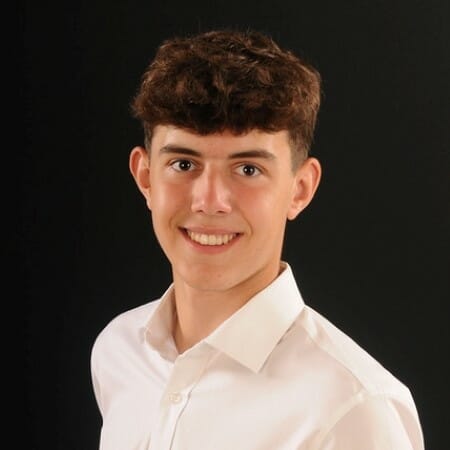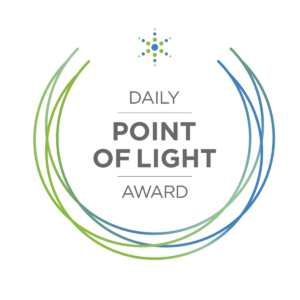Son of Immigrants Works to Create Unity Through Basketball


Meet Daily Point of Light Award honoree George Todorovich. Read his story and nominate an outstanding volunteer or family as a Daily Point of Light.
Born in New York City to parents who emigrated from the former Yugoslavia, George is the oldest of four children. An avid athlete, George has turned his passion for basketball into a force for good in his parents’ home region. Through his nonprofit, Homeland Hoops, George works to renovate community basketball courts in the former Yugoslavia and provide mentorship to young athletes. To date, Homeland Hoops has connected over 100 youth to mentors, and raised over $20,000 to refurbish three basketball courts in Serbia and Bosnia, impacting nearly 10,000 individuals living in the local communities.
Read on to learn about George’s mission, including a service celebration of the 100th anniversary of basketball in Serbia.
What inspires you to volunteer?
In 2015, I visited the Balkans for the first time. My parents took me to where they were from and I vividly remember the playgrounds and parks where the local kids hung out. What stood out was the condition of the basketball courts. I saw cracked concrete and beat-up boards and hoops, but still the kids were having a great time.
I combined my passions for basketball and my roots in the former Yugoslavia. Basketball is huge in Serbia, Bosnia, Croatia, Montenegro and the other smaller countries that emerged from the breakup of Yugoslavia. Today, many top NBA players are from that region. I believe that if the youth from these countries are given the same opportunities as kids have in the United States, the youth would be better off in terms of opportunities to play pro basketball, and their lives in general.

My parents’ experiences with the war through the 1990s shaped my desire to help. Even today, the region is divided ethnically and religiously. Still, the region is one of the greatest sources of elite basketball players. This demonstrates just how much of a unifying force basketball can be.
A couple of years ago, I was suffering from sports injuries. From 8th to 10th grade, I was out of sports, and, because of that, I decided that even though I couldn’t play myself, I wanted to contribute to basketball in another way. I created Homeland Hoops during that time.
Describe your volunteer role with Homeland Hoops.
Currently I’m focused on a new project called the King Peter Project which is a court renovation project that will be installed in time for the 100th anniversary of basketball in Serbia. The first game in the “Land of Basketball” was organized at the King Peter School by the American Red Cross. Since then, the sport has really taken off in Serbia and other Balkan countries, but the infrastructure is in bad shape.
Right now, I’m talking to companies about the designs of the courts and pricing for the King Peter Project. I am also working on social media to help solicit donations. I also update the website and social media, and organize meetings among board members.
The two aspects of our mentorship program are called Man to Man and Zone Defense. Man to Man connects youth athletes to college athletes in the region. Zone Defense provides mentors for college athletes who help prepare them for life after college. My role is to reach out to potential mentors and mentees and connect them with each other.
What’s been the most rewarding part of your work?
On our website you can see before and after pictures of our courts. Looking at what kids had before versus what they have now is so rewarding because I see the impact that we’ve made. Last summer I visited one of the locations where we installed a court, and saw how much nicer it is and how the community is happy and grateful for the courts we’ve installed.
What have you learned through your experiences as a volunteer?
Community service isn’t just about giving back to the community you live in. You can also give back to people all over the world and make a global impact. People often think that community service emphasizes where they live. I’ve found that even kids my age can make a global impact.
Are there any future partnerships, programs, or events that you are excited about?
In addition to the King Peter Project, we’re planning a 100th anniversary celebration of basketball in Serbia. We hope to unite the city Belgrade around basketball.
Why is it important for others to get involved with causes they care about?
When you’re passionate about something, you’ll work on it ceaselessly. People often ask me how I have time for Homeland Hoops when I’m already busy with school. But it doesn’t feel like work because it’s something that I love doing. If you find something you’re passionate about improving, you’ll have that same ceaseless desire to work on it.
Thinking about the youth back in Serbia and if my parents hadn’t emigrated, I would be one of those kids playing basketball in parks that are still in bad shape from the war, which lasted a decade. I want there to be nice hoops, nice basketballs and nice courts for the kids who are still there.
What do you want people to learn from your story?
Even though I’m removed from the region because I live in the United States, I still have a connection there and want to make an impact. Anyone can do this. If you feel ties to somewhere, you can find ways to help.
Do you want to make a difference in your community like George? Find local volunteer opportunities.
